Fallout Hub » Discussions
Ghouls: A Ferality Primer
Tags: #Valentine Detective Agency Article-
6 people like this
-
To: Nick Valentine
Fr: Detective Ragin Cajun
Re: Ghoul Case
Nick, what follows is my findings into ghouls and specifically feral ghouls. This entailed many interviews with various people and groups around the Commonwealth, including actually speaking with actual ghouls. I even tried to get some on the record comments from some ferals to present both sides of the discussion but they didn't seem willing to talk with me. Anyway, sorry for the scraps of paper. It's the best I could rummage up to jot down my discourse on the case notes. I hope this is helpful to you and our client.
Regards,
RC (Valentines Detective Agency)
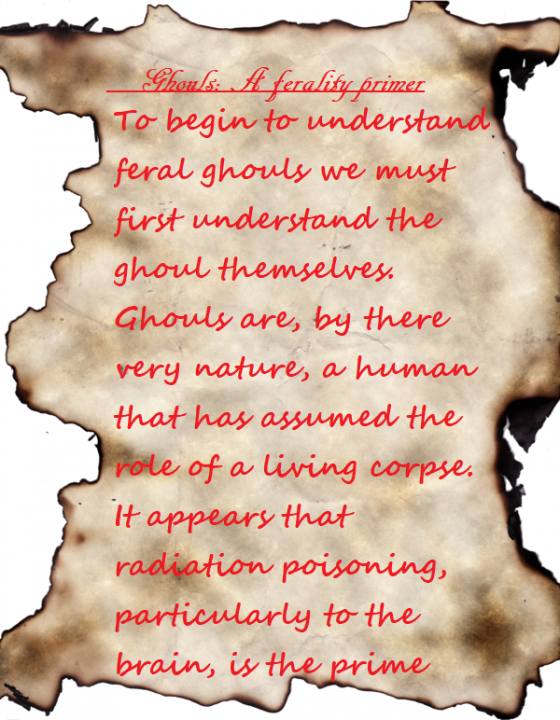
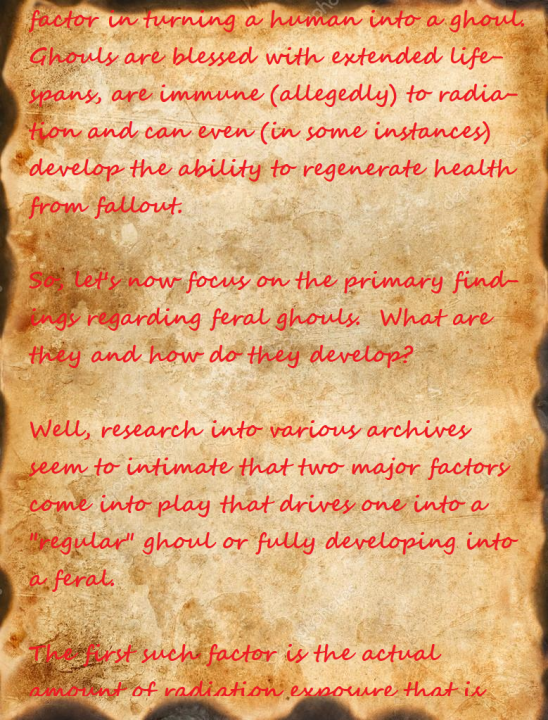
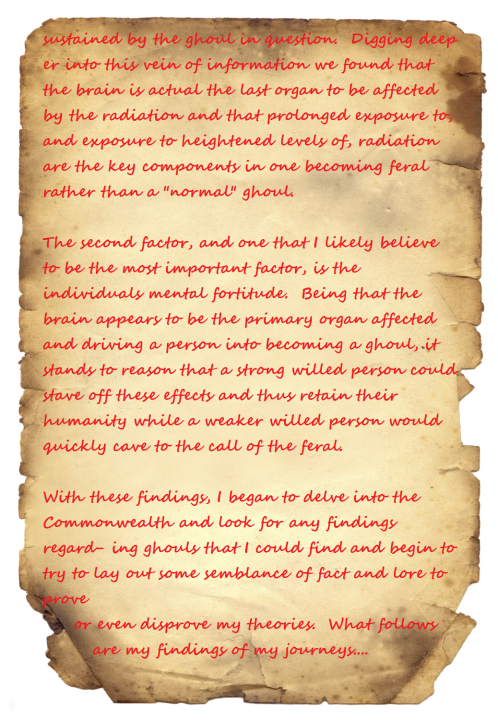
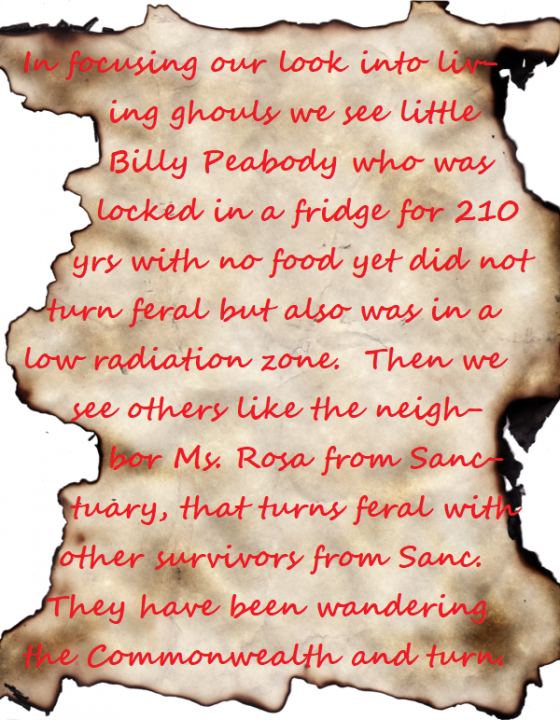

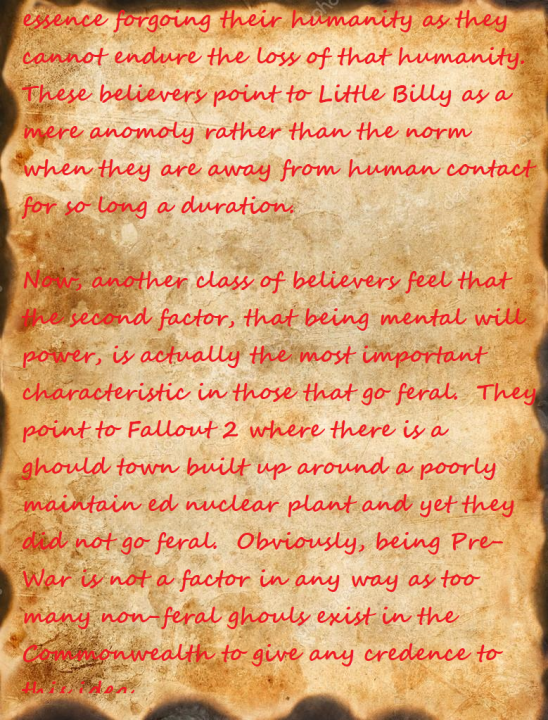
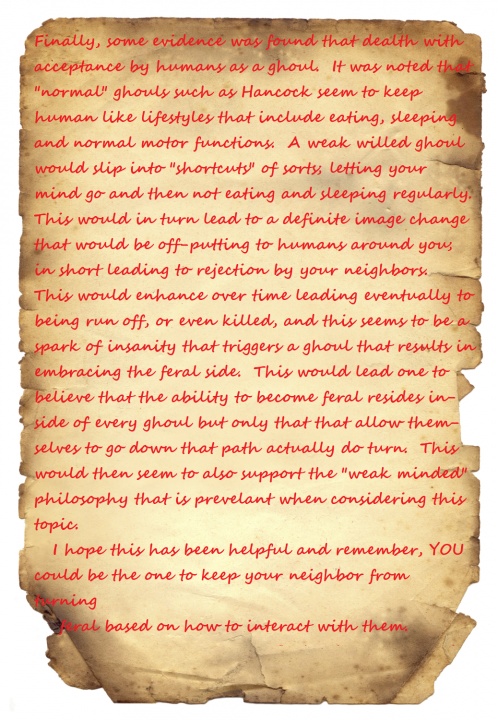
To: Nick Valentine
Fr: Detective Ragin Cajun
Re: Ghoul Case
Nick, what follows is my findings into ghouls and specifically feral ghouls. This entailed many interviews with various people and groups around the Commonwealth, including actually speaking with actual ghouls. I even tried to get some on the record comments from some ferals to present both sides of the discussion but they didn't seem willing to talk with me. Anyway, sorry for the scraps of paper. It's the best I could rummage up to jot down my discourse on the case notes. I hope this is helpful to you and our client.
Regards,
RC (Valentines Detective Agency)







-
I love how you presented this! VERY creative and I really enjoyed reading it. I like how it gives that real-life perspective of "hey, my buddy could slowly start losing who he is as a person and I would then have to essentially bannish him so he doesn't eat me in my sleep." It's easy when we're playing to just shoot up ghouls without a thought and then hardly even consider the perspective of Hancock as a person. Almost sad in a way. Anywho, great job Ragin! The Detective Agency thanks you
I love how you presented this! VERY creative and I really enjoyed reading it. I like how it gives that real-life perspective of "hey, my buddy could slowly start losing who he is as a person and I would then have to essentially bannish him so he doesn't eat me in my sleep." It's easy when we're playing to just shoot up ghouls without a thought and then hardly even consider the perspective of Hancock as a person. Almost sad in a way. Anywho, great job Ragin! The Detective Agency thanks you
-
Great work, so far. But I believe we have much to learn on the subject.
First of all, I believe that one of the most important thing in understanding ghouls is that they are, or were, human. And thus, we must understand that, like humans, there can be many factors involved in a ghoul becoming feral.
The research into factors such as radiation exposure and willpower, and positive reinforcement of “human” behavior are excellent, but I would put forward another theory that, when combined with the work you have already done, would present a clearer picture.
My theory is this: As influential as positive reinforcement can be, the negative reinforcement of association with ferals can be equally influential.
We are at our core social creatures, and we have a tendency to assimilate into our social circles. This is a phenomenon of human interaction that has been well documented, and I believe that it can be argue that it happens with ghouls as well.
My first example would be the ghouls of the magical Kingdom in Nuka World. The particular case of Rachel I find most significant. Because although she held on to her sanity far longer than most ghouls, almost two hundred years, she eventually succumbed. While one could argue that the irradiated defenses employed by her and Oswald may have played a factor, we also find social non-ferals living in similarly irradiated location without turning.
I would also point out the validity of your willpower argument in this case, as it seems apparent from the documentation that we have that the two most willful members of the Magical Kingdom, Rachel and Oswald, held on to their “humanity” far longer than the others.
In addition I would bring up cases that you mentioned, Billy Peabody, and Edgar Winter.
They are both living in absolute isolation; without the social influence of a normal society, but also without the influence of feral ghouls. While they may not be able to go through the normal social routines that reinforce their humanity, their subconscious is not being influenced toward ferality. Again, my assertion is not counterintuitive of your argument of willpower. These two examples are not the only instances where a ghoul was isolated. And in fact, those isolated often turn, simply due to the lack of positive “human” reinforcement. An example of this would be the Director of Cambridge Polymer Labs, Jon Elwood.
In conclusion, I would reiterate that my research and conclusions do not in any way refute any of your findings, but rather reinforces the importance of providing positive social interactions to our somewhat putrefied friends.
Great work, so far. But I believe we have much to learn on the subject.
First of all, I believe that one of the most important thing in understanding ghouls is that they are, or were, human. And thus, we must understand that, like humans, there can be many factors involved in a ghoul becoming feral.
The research into factors such as radiation exposure and willpower, and positive reinforcement of “human” behavior are excellent, but I would put forward another theory that, when combined with the work you have already done, would present a clearer picture.
My theory is this: As influential as positive reinforcement can be, the negative reinforcement of association with ferals can be equally influential.
We are at our core social creatures, and we have a tendency to assimilate into our social circles. This is a phenomenon of human interaction that has been well documented, and I believe that it can be argue that it happens with ghouls as well.
My first example would be the ghouls of the magical Kingdom in Nuka World. The particular case of Rachel I find most significant. Because although she held on to her sanity far longer than most ghouls, almost two hundred years, she eventually succumbed. While one could argue that the irradiated defenses employed by her and Oswald may have played a factor, we also find social non-ferals living in similarly irradiated location without turning.
I would also point out the validity of your willpower argument in this case, as it seems apparent from the documentation that we have that the two most willful members of the Magical Kingdom, Rachel and Oswald, held on to their “humanity” far longer than the others.
In addition I would bring up cases that you mentioned, Billy Peabody, and Edgar Winter.
They are both living in absolute isolation; without the social influence of a normal society, but also without the influence of feral ghouls. While they may not be able to go through the normal social routines that reinforce their humanity, their subconscious is not being influenced toward ferality. Again, my assertion is not counterintuitive of your argument of willpower. These two examples are not the only instances where a ghoul was isolated. And in fact, those isolated often turn, simply due to the lack of positive “human” reinforcement. An example of this would be the Director of Cambridge Polymer Labs, Jon Elwood.
In conclusion, I would reiterate that my research and conclusions do not in any way refute any of your findings, but rather reinforces the importance of providing positive social interactions to our somewhat putrefied friends.



